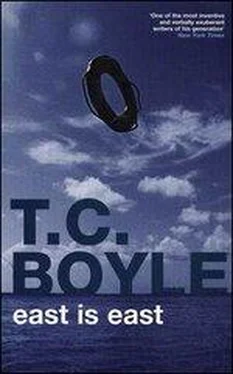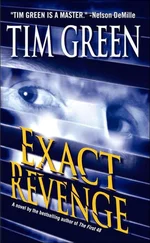Tom Boyle - East is East
Здесь есть возможность читать онлайн «Tom Boyle - East is East» весь текст электронной книги совершенно бесплатно (целиком полную версию без сокращений). В некоторых случаях можно слушать аудио, скачать через торрент в формате fb2 и присутствует краткое содержание. Жанр: Современная проза, на английском языке. Описание произведения, (предисловие) а так же отзывы посетителей доступны на портале библиотеки ЛибКат.
- Название:East is East
- Автор:
- Жанр:
- Год:неизвестен
- ISBN:нет данных
- Рейтинг книги:5 / 5. Голосов: 1
-
Избранное:Добавить в избранное
- Отзывы:
-
Ваша оценка:
- 100
- 1
- 2
- 3
- 4
- 5
East is East: краткое содержание, описание и аннотация
Предлагаем к чтению аннотацию, описание, краткое содержание или предисловие (зависит от того, что написал сам автор книги «East is East»). Если вы не нашли необходимую информацию о книге — напишите в комментариях, мы постараемся отыскать её.
, praised by
in
as "one of the most exciting young fiction writers in America," the result is a sexy, hilarious tragicomedy of thwarted expectations and mistaken identity, love, jealousy, and betrayal.
East is East — читать онлайн бесплатно полную книгу (весь текст) целиком
Ниже представлен текст книги, разбитый по страницам. Система сохранения места последней прочитанной страницы, позволяет с удобством читать онлайн бесплатно книгу «East is East», без необходимости каждый раз заново искать на чём Вы остановились. Поставьте закладку, и сможете в любой момент перейти на страницу, на которой закончили чтение.
Интервал:
Закладка:
Ambly Wooster looked startled, as if she’d wakened from a dream. Hiro saw now just how old she was, older than his obāsan, older than the bird that laid the thousand-year-old egg, older than anything. “Why, the shore,” she said, “the Georgia coast. This is an island we’re on. Tupelo Island.” She paused a moment, blinking at him out of her watery old eyes. “What did you say your name was?”
An island. All the warmth went out of him like air from a balloon. So he was trapped, and the highway went nowhere. He cleared his throat. “Seiji,” he said.
The old lady studied him a long moment, silent for the first time in the past six hours. “Seiji,” she repeated finally, regarding him with a cold eye, as if she’d never seen him before, as if she were wondering how he’d ever come to invade her house, her dining room, the sanctum of her library.
Was there a bridge? he wondered. A ferry? Could he swim to shore? He held her eyes, trying his best to look humble, thankful, needful, all the while certain that she was about to order him out of the house, call the police, have him bound and manacled and flung into that dark foul gaijin cell that was his destiny. But then an evil thought crept into his head: what could she do, after all, old as she was and alone in the house with an invalid husband and the deep pulsating silence of the night?
“You’ll need a towel,” she said suddenly, pushing herself up from the chair to gaze serenely on him, her blue-veined hands dangling at her sides. And then she smiled. “So rude of me—here I’ve kept you till all hours chattering away like an old mynah bird—what you must think of me, poor man.” Then she turned and started out of the room. “Well, come on, then,” she said, pausing at the threshold, “I’ll show you to your room.”
He followed her through the softly glowing house, up the stairs and down a long carpeted corridor, in the middle of which she paused to glance over her shoulder and put a finger to her lips. “Shhhh,” she whispered, pointing to a closed door, “Barton.” He nodded, vaguely aware of a smell of medication and the soft suck and rattle of labored breathing, and then they were moving again, noiselessly, the old woman’s narrow shoulder blades working beneath the thin fabric of her blouse. “Here,” she said, swinging back a varnished door at the end of the corridor and stepping aside for him.
At first he thought she was having a little joke—this couldn’t be the room; it was huge, the size of a dormitory, big enough for racquetball, gymnastics, a swimming pool. And for all her talk of futons, it was dominated by a huge canopied bed that seemed to float over the carpet like a ship under sail. There was an overstuffed couch too, and an armchair. He could see a bathroom beyond it, a TV, air conditioner, windows that gave onto the sea. Twin reading lamps on either side of the bed bathed the room in a rich golden light. He hesitated, but she took him by the arm and ushered him in. “Sleep tight,” she said, handing him a towel, “and if there’s anything you need, you just let me know. Nightie-night.” And the door clicked shut behind him.
He felt drunk. Exhilarated. So pleased with himself he laughed aloud. The bed—it was amazing, stupendous, big enough to sleep the entire crew of the Tokachi-maru and Captain Nishizawa too. He tumbled into it, kicking up his heels, bouncing high off the springs, all the while giggling like a child on a trampoline. In the next moment he was in the gleaming bathroom—as big itself as the entire apartment he’d shared with his obāsan —and he was rifling the drawers: soap, shampoo, cologne, an electric razor, aftershave. It was too much. He was dreaming. And then all at once he caught a glimpse of himself in the mirror and the elation went out of him.
It made him catch his breath. Made him look again.
But no, it couldn’t be. This wasn’t Hiro Tanaka staring back at him—not this raggedy bum, not this derelict with the matted hair and sunken cheeks, with the fingernails like a grave digger’s and a patchwork of filthy bandages hanging from him like so much sloughed skin. He was twenty years old and he looked sixty—this was what America had done for him. Suddenly he was frightened. He saw himself through the changeless weary succession of weeks and months and years to come, running, hiding, begging, living like a Burakumin —an untouchable—in the anonymous streets of an alien world, too hopeless to get a job, too degraded, too filthy. He’d fallen from grace, and the muddied earth had rushed up to engulf him.
He stared into the mirror and despair overwhelmed him, but then, after a period, he glanced at the shower. It was the first shower he’d seen in over a month. He paused a moment to examine it dispassionately, as if he were a student of showers. He slid back the glass door, studied the gleaming controls, the soap dish, the pale scented bar of French soap that made the whole room smell like an orchard. And he examined the tub beneath it, too—the tub in which you could soak a blistered, aching body for hours at a time. Before he knew what he was doing, he was stripping off the filthy bandages, the ludicrous shorts and sweat-stained T-shirt, and he began to feel better. When he turned the knobs experimentally, water thundered from the showerhead, and the sound of it, the smell of it, made him feel better still. And then, wholly converted, he stepped into the tub and let the water wash over him, and it was cleansing, pure, redemptive and sweet.
The day was terrifically hot, a real slap-in-the-face, dog-under-the-house sort of day, the sort of day when a man just wanted to kick back with a cold beer and a plate of crab and listen to the Braves sweat their sorry asses round the diamond. The thing was, he’d promised those Tupelo Shores people he’d do the lawn and trim the shrubs, and he needed the money. Not for himself—he had his chew, his garden, all the crab and oyster and fat pink mullet his traps could hold—but for his nephew. Royal wanted one of those spike-studded wristbands they all wore on MTV, and Olmstead White was planning to surprise him on his birthday. But then, on second thought, maybe he could use a little cash for himself too—he’d managed to save most of his things from the fire, the necessities anyway, and he’d been able to move into the reconverted chicken coop out back without any real hardship—but there were a few things he could use. Like some towels and toilet articles—he liked his eau de cologne and his bay rum, liked to smell nice for the ladies, and all those bottles had gone up like firecrackers on him. And so, heat or no heat, after a lunch of black beans and rice with a chopped onion and a dash of the hot sauce he’d made himself from dried cherry peppers and garlic, he looped his machete round the handlebars of his bicycle, swung a leg over, and started down the hard black frying-pan of the road for the big estates at the other end of the island.
It was a ten-mile ride, nearly all of it as flat as his kitchen table, and normally it was nothing for him—he could have gone twice as far and back again without even breathing hard. But he was a little out of sorts today—maybe it was the heat—and though he coasted whenever he could, each time he dug at the pedals he felt a tightness in his chest, as if somebody had slipped a noose under his arms. He’d start in pedaling and he could feel the noose cinch up on him, squeezing all the air out of his lungs, and he just couldn’t seem to draw his breath. His bad hip was acting up too, and his hand, blistered and raw beneath the clean white yard-and-a-half-long strip of gauze, burned as fiercely as it had the day that Chinaman had tried to deep-fry it. Three miles down the road, just past Cribbs’ store, he thought he’d turn around and go on back home, he was feeling that poorly, but then he thought of that helpless jabbering old white lady and her laid-up husband, and figured he was the better part of halfway there already, and he kept on going.
Читать дальшеИнтервал:
Закладка:
Похожие книги на «East is East»
Представляем Вашему вниманию похожие книги на «East is East» списком для выбора. Мы отобрали схожую по названию и смыслу литературу в надежде предоставить читателям больше вариантов отыскать новые, интересные, ещё непрочитанные произведения.
Обсуждение, отзывы о книге «East is East» и просто собственные мнения читателей. Оставьте ваши комментарии, напишите, что Вы думаете о произведении, его смысле или главных героях. Укажите что конкретно понравилось, а что нет, и почему Вы так считаете.











